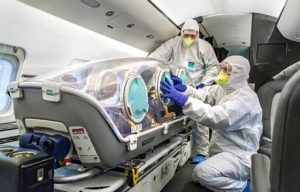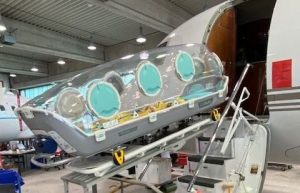Overview
The global Covid-19 pandemic has forced a mass global shutdown of industries and travel. The first warnings of a Novel Coronavirus with airborne transmission and high lethality came from China in December 2019. Back then few could have predicted the scale of the global impact this virus would have. Over the past few weeks Med ResQ has been supporting its clients through an ever changing medical and geo-political environment and arranging the safe repatriation of patients during a global lock down. We have had to negotiate with embassies, immigration, and border authorities as well as hospitals to get special permissions for transiting patients. Covid-19 testing certification has now become a common requirement for any person needing to travel.
Most international airlines have now grounded their aircraft fleet, apart from a limited number of routes and rescue flight laid on by governments to recover its citizens. Providing medical escorts on commercial flights has now become mostly impossible due to the strict border restrictions and the quarantine requirements enforced by most countries. However patient transfers by dedicated Air Ambulance are still possible and Med ResQ has successfully coordinated many short haul and intercontinental private Air Ambulance flights in recent weeks.
Transporting Covid-19 Patients by Air
The current number of confirmed Covid-19 cases worldwide is nearly 3 million however the real figure including non-confirmed cases is thought to be much, much higher. Many of these cases have presented in Western Europe and the United States, however a devastating spread of Covid-19 in less developed nations in Africa and Asia is expected. This is of particular concern due to the serious lack of healthcare infrastructure in many of these countries. Transferring of patients with confirmed Covid-19 (or patients who are suspected to have been exposed but do not have access to testing) is possible in most parts of the world.
Thanks to our global network of air ambulances, we can provide international patient transfers, including Covid-19 patients, utilising negative pressure portable medical isolation units (PMIU). This state of the art technology allows us to transfer infectious patients whilst minimising the risk to the flight medical teams and crew. There are a number of variations of PMIU in use however most utilise the same principle of quarantining the patient in a negative pressure environment so that air can diffuse into the chamber however potentially infected air cannot travel outside without passing through special filtration systems. For conscious patients, some mild sedation may be required to allow them to better tolerate the confined nature of the PMIU. Medical teams transferring Covid-19 patients have received specific training in managing these cases in line with the European Centre for Disease Control (ECDC) Directive.
Should a patient be transferred during the current crisis?
There are many different factors for consideration when deciding if it is appropriate to move any patient by air. Some factors will be considered a part of our normal risk assessment process however there are many new complicating factors for consideration in the current pandemic.
- What is the capability of the treating facility?
No matter what the patient’s condition, our first consideration will be to assess whether the patient in a place of safety and if can the facility meet the clinical needs of the patient both in terms of medical expertise and medical equipment. We will also consider the possible evolution of the condition and whether this is likely to exceed the hospital capabilities.
- What is the current Covid-19 situation locally?
We consider if the hospital’s capability been compromised by the pandemic or whether it is likely to be compromised in the near future. We have had reports of foreign nationals being given lower priority over citizens in certain countries.
- If a non Covid-19 patient, are they a vulnerable person at increased risk from the virus?
Hospitals are natural breeding grounds for Covid-19 and infection control measures vary significantly around the world. Particularly vulnerable patients, such as those suffering respiratory, cardiac or immunocompromising conditions would be at very high risk if they were to contract Covid-19 in hospital. This may influence the decision to move the patient sooner to a facility with a lower risk of exposure.
- Is there a suitable hospital willing to accept the patient?
Virtually every country in the world has been impacted by Covid-19. Those that have been worst affected have over stretched healthcare and those that are less affected have hospitals which are very reluctant to accept patients who are travelling from overseas. Arranging hospital beds admissions can be very challenging, however we have successfully worked closely with hospital staff in the NHS and overseas healthcare providers to re-assure and gain trust in order to secure safe transfers and admissions.
- What are the transfer medical requirements?
We will risk assess each patient on a case by case basis by looking at a combination of the already mentioned considerations. All Air Ambulance transfers are performed by specially trained and experienced doctors and nurses/paramedics. Infection control measures will be in place on all flights however these may range from staff utilising standard PPE through to the use of specialist teams with PMIU equipment.


Get in contact for advice
Med ResQ remains on hand 24/7 to provide advice and support for any medical cases during this unprecedented global crisis. Things continue to evolve quickly and what is written in this article is subject to change. Our medical and operations specialists are continually monitoring the global situation and are on hand to advise you on any international medical case, giving you the most up to date options for any necessary repatriation.



